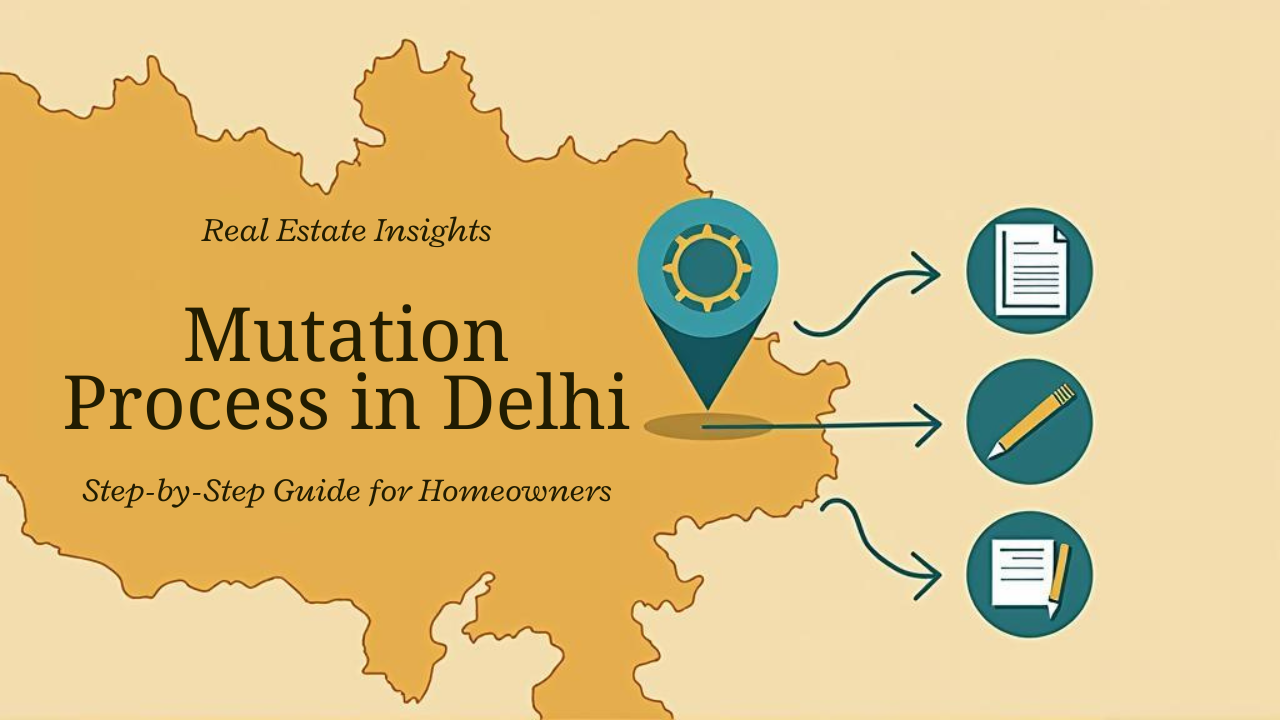Introduction
If you’re a property owner in Delhi, understanding the mutation process is crucial. Mutation refers to updating the ownership details in government records when a property changes hands. This process ensures that property taxes and other liabilities are correctly assigned to the new owner. Whether you’ve purchased a new property or inherited one, this guide will walk you through the mutation process in Delhi, highlighting its importance, required documents, and how to apply both online and offline.
What is Property Mutation?
Property mutation is the legal procedure of transferring the title of a property from one individual to another in the official records maintained by local authorities. In Delhi, this process is overseen by the Municipal Corporation of Delhi (MCD) or the respective Tehsildar’s office, depending on the property’s location.
The primary purpose of mutation is to:
- Legally recognize the new owner in government records.
- Ensure that property taxes are correctly assigned to the current owner.
- Serve as proof of ownership for future transactions or legal matters.
Why is Mutation Important?
- Legal Recognition: Mutation provides official acknowledgment of the new owner’s rights over the property.
- Taxation: It ensures that property taxes are levied on the rightful owner, preventing any future disputes.
- Proof of Ownership: A mutation certificate serves as valid evidence of ownership, which is essential for selling, mortgaging, or transferring the property in the future.
- Utility Services: Many utility providers require a mutation certificate to transfer services like water, electricity, and gas to the new owner’s name.
Documents Required for Property Mutation in Delhi
The documents required may vary based on the nature of the property transfer (sale, inheritance, gift, etc.). However, the common documents include:
- Sale Deed: The legal document evidencing the sale of the property.
- Death Certificate: Required if the property transfer is due to inheritance.
- Will or Probate: If the property is inherited through a will, a copy of the will or its probate is necessary.
- Identity Proof: Copies of government-issued identity proofs of both the buyer and the seller.
- Property Tax Receipts: Latest receipts to show that property taxes are up to date.
- Affidavit: A sworn statement detailing the transfer and confirming the authenticity of the documents.
- Photographs: Passport-sized photographs of the buyer and seller.
Steps to Apply for Property Mutation in Delhi
Online Application Process:
- Visit the Official Website: Go to the Municipal Corporation of Delhi’s official portal.
- Register/Login: Create an account or log in if you already have one.
- Navigate to Property Tax Section: Under ‘Online Services,’ select ‘Property Tax.’
- Search Property Details: Enter the Unique Property Identification Code (UPIC) or other property details to fetch the records.
- Apply for Mutation: Choose the option to apply for property mutation and fill in the required details.
- Upload Documents: Attach all necessary documents as per the guidelines.
- Pay Fees: Complete the payment for the mutation application fee.
- Track Status: Use the application number to track the status of your mutation request.
Offline Application Process:
- Visit the Local MCD Office: Go to the MCD office in your area.
- Obtain Application Form: Request the property mutation application form.
- Fill in Details: Complete the form with accurate information.
- Submit Documents: Provide all the required documents along with the filled application form.
- Pay Fees: Pay the applicable mutation fee at the counter.
- Verification: The authorities will verify the submitted documents and may conduct a site inspection.
- Mutation Certificate: Upon successful verification, the mutation certificate will be issued.
Fees and Timeframe
The mutation fee in Delhi typically ranges between ₹25 to ₹100, depending on the nature of the property and the type of transfer. The entire process usually takes about 15 to 30 days, provided all documents are in order and there are no discrepancies.
Common Reasons for Mutation
- Sale of Property: When a property is sold, the new owner’s details must be updated.
- Inheritance: If the property is inherited, the legal heirs need to have their names mutated in the records.
- Gift Deed: When a property is transferred as a gift, mutation is necessary.
- Division of Property: In cases of partition among family members, mutation ensures that each individual’s share is recorded.
Challenges in the Mutation Process
While the mutation process is straightforward, some challenges may arise:
- Incomplete Documentation: Missing or incorrect documents can delay the process.
- Discrepancies in Records: Mismatched details between the property documents and government records can cause issues.
- Legal Disputes: In cases of inheritance, disputes among heirs can complicate the mutation process.
Tips for a Smooth Mutation Process
- Ensure Complete Documentation: Double-check that all required documents are in order.
- Verify Property Details: Cross-verify the property’s details in government records before applying.
- Seek Legal Assistance: If the property transfer involves inheritance or disputes, consult a legal expert.
- Keep Copies: Always retain copies of all submitted documents and receipts.
Conclusion
Understanding and completing the property mutation process is essential for every property owner in Delhi. It not only legitimizes your ownership but also ensures that you are recognized as the rightful owner in all official records. Whether you’re dealing with a newly purchased property or handling inheritance matters, following the correct procedure will save you from potential legal hassles in the future.
If you need assistance with the mutation process or have any questions, feel free to reach out. We’re here to help you navigate the complexities of property ownership in Delhi.

